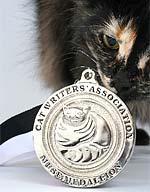 |
|||||||||||||||||||
|
|

We are the proud winners of the 2006 - 2009 winner of the Muse Medallion for Online Magazine by The Cat Writers? Association in their annual Communications Contest! (Photo courtesy of Weems Hutto).
On November 17, 2007 Felinexpress.com was honored to receive The President's Award by the Cat Writers' Association. We are very proud to have earned this distinction and will continue to provide quality information for all cat lovers.
Felinexpress.com Home > Kitten Care > My Cat Suckles Me! |
My Cat Suckles Me!
Why do some cats suckle objects?
The first instinctive action that kittens perform is suckling the queen’s nipples to obtain food. Guided by her purr, hours old, sightless kittens make their way up to the milk bar to find their place. Once they are suckling on the nipple, their tiny paws come up and begin kneading the queen’s belly. They answer her purr with one of their own, in hours old kittens, this purr is underdeveloped and not able to be heard by humans.
The kneading releases the kitten’s own scent “marking” the nipple for later. This marking is why you see a lot of jostling and wrestling within a litter of kittens while nursing. Taking one kitten off a nipple will result in an indignant meow, and if the kitten is placed on another nipple where his scent cannot be found, he quickly finds his way back to “his” chosen nipple.
Kittens removed from the queen earlier than before they are weaned (no earlier than 6 weeks old) will revert back to instinctively needing to suckle. Bottle feeding doesn’t compare to replacing a soft nipple on a milk-filled belly. Kittens will begin to find other objects to suckle; a blanket, a bathrobe, a sock, a stuffed animal or even your arm.
In an abandoned litter, the danger comes down to what is being suckled. The easiest targets become the male kittens. Their genitals are what feel the most like mom’s nipples. Both sighted and sightless kittens often search for this. The kitten targeted will be pushed down into the bottom of the pile, suckled on and peed on.
The pressure of the littermates on the kitten and the resulting urine scald can cause major problems. In a litter with all female kittens, paws also become targets of choice.
Kittens being suckled become weak and will die if the litter is not separated. You will need to take a large cardboard box and divide the box by sections. You can use cardboard inserts, or as the author of Kittens for Dummies, Dusty Rainbolt once shared with me, you can use screen to separate the kittens. This way, the kittens can smell each other and the separation anxiety isn’t so extreme.
If no screen is available, use cardboard inserts. Using a screwdriver, punch several lines of holes near the bottom of each insert, so the kittens are able to still scent out each other. www.snuggleme.com is an excellent tool to use for orphaned kittens as well.
But if you are left with a large orphaned litter, you can use stuffed dog toys, one for each kitten, as a substitute for their littermate. Make sure the toy is pliable, the kitten needs to be able to knead and suckle and manipulate the object in order to find comfort.
If the kitten is suckling your arm, using lemon scented hand lotion discourages the suckling behavior. Bitter apple spray is an excellent deterrent to quench the suckling behavior.
Although some people think that suckling kittens are “cute” the behavior can turn into a major problem if not redirected. Suckling kittens can grow up and begin to suckle on their paw or their tail, causing skin issues and infections.
Suckling is a way for kittens and cats to obtain comfort. Similar to the way a human baby reacts to a pacifier the kitten will react much the same way to the substitute object. Most kittens will outgrow the behavior, reverting back to suckling when they are scared or ill. The action calms them down and they will purr as they suckle and knead.
Mary Anne Miller is a freelance writer, website content provider and member of The Cat Writers’ Association. Her expertise lies in feral cat socialization, bottle babies and animal abuse issues.
More cat breeds |
|
? Copyright 2006-2010 Felinexpress.com, All Rights Reserved
Privacy Statement - Disclaimer - About Me


